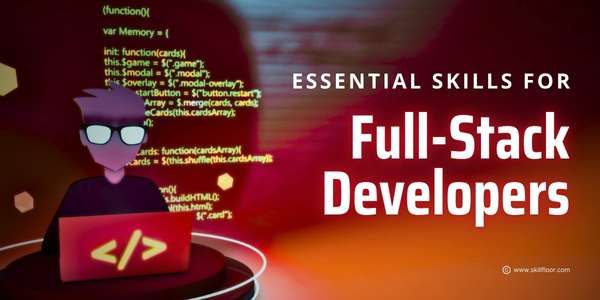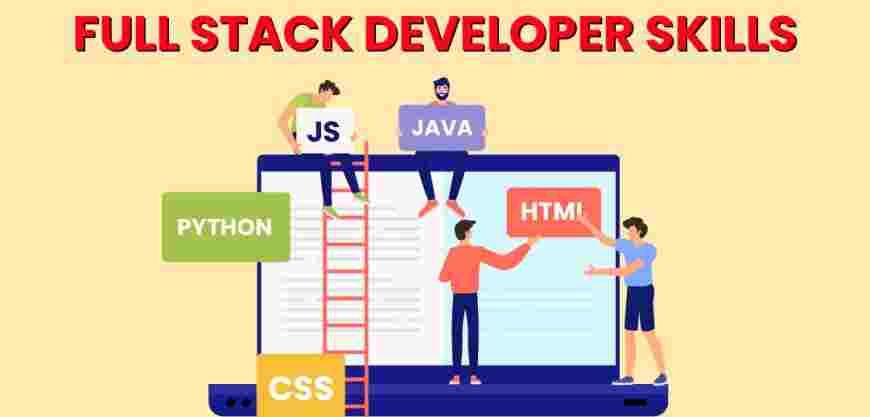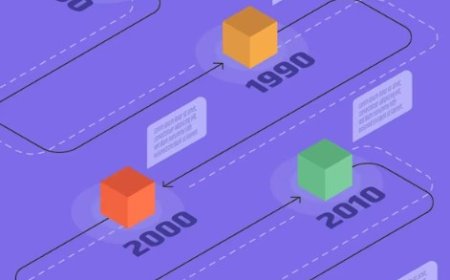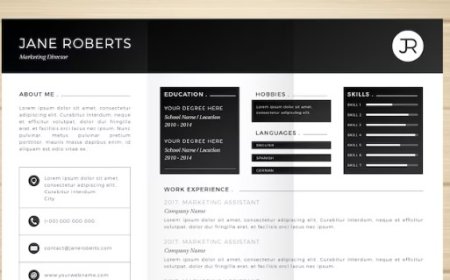Full Stack Developer Skills Every Professional Needs
Essential full stack developer skills, from front-end frameworks to back-end programming, problem-solving, and DevOps, make developers versatile and invaluable to tech teams.

As a full-stack developer, I've come to understand the importance of these abilities. I learned that genuine development is more than simply coding when I assisted a business in turning its app from a fragmented concept into a useful, user-friendly solution. It's about bridging gaps to realize ideas.
The goal of full-stack development is to master connections, not to know a little bit about everything. From using React or Vue to create responsive front ends to using Node.js or Django to enable growth on the back end, true competence is in connecting these layers. Making a difference by solving problems and guaranteeing smooth integration is crucial. Very powerful.
It is worthwhile to pursue a career in full-stack development. By being proficient in both areas, I have witnessed engineers, including one I trained, advance from front-end experts to project managers. Because of their adaptability and strong problem-solving abilities, teams like full-stack professionals.
What Is a Full Stack Developer?
Front-end and back-end development are both handled by a tech specialist known as a full-stack developer. They utilize technologies like React or Vue to create user-friendly interfaces, and they employ Node.js or Django to make sure server-side activities function properly. Their adaptability renders them indispensable members of any team.
These developers help to connect data and design. Full-stack developers make sure every component of an application functions as a whole, whether they are creating smooth user interactions or streamlining database queries. Their wide range of abilities enables them to tackle challenging issues and get projects through to completion.
The Benefits of Becoming a Full-Stack Developer
-
Versatile Skill Set: Gaining proficiency in both front-end and back-end programming enables you to work on finished projects, which makes you an invaluable member of any IT team or business.
-
Career Growth: Since full-stack developers' diverse skill set makes them ideal for project management and important architectural choices, they frequently advance swiftly into leadership positions.
-
Problem-Solving Mastery: Knowing how various tech layers work together enables you to troubleshoot complicated problems quickly and effectively, making you the go-to person for problems that need to be resolved.
-
Higher Demand: Because full stack developers can move between activities with ease and complete projects with fewer hand-offs, they are widely sought after by businesses, particularly in fast-paced sectors.
-
Creative Freedom: Knowing every aspect of development will help you realize your ideas more on your own and create original solutions without needing the assistance of specialist team members.
-
Better Communication: Your proficiency with both front-end and back-end procedures enables you to interact with other teams in an efficient manner, facilitating cooperation and minimizing miscommunications throughout the project development process.
Why Full Stack Development Matters in Today’s Industry
The necessity for developers who can manage both client-side and server-side duties makes full-stack development essential in today's digital sector. For companies striving for agility, full-stack developers are essential because they expedite development cycles, simplify processes, and minimize hand-offs between specialist teams.
Developing dynamic user interfaces and optimizing server-side code are only two examples of full stack developer skills. Possessing these all-encompassing abilities guarantees that developers can resolve complicated problems and preserve performance throughout. Because they enable a smooth integration of technology that fosters both creativity and scalability, full stack developer skills are highly valued by businesses.
By bridging communication barriers across teams, this dual competence ensures a more effective workflow. Because they can adjust to changing project requirements and have a broad perspective, full-stack developers are dependable issue solvers. From inception to conclusion, projects may proceed smoothly because of their capacity to look through the complete tech stack.
Essential Skills for Every Full-Stack Developer
1. Front-End Development Skills
The creation of the user-interactive elements of a website or application is known as front-end development. The following must be mastered to be a proficient full stack developer:
-
HTML and CSS: These are the foundational elements of every website. It is crucial to know how to produce clear, semantic HTML and style it using CSS.
-
JavaScript: The foundation of developing interactive websites is JavaScript. It enables you to create responsive and dynamic websites. For Full Stack Developer Skills, familiarity with contemporary features such as ES6 and beyond is essential.
-
Front-End Frameworks: React, Angular, Vue.js, and other libraries and frameworks make it simpler and more effective to create sophisticated user interfaces. Being aware of at least one of these is really beneficial.
-
Responsive Design: Delivering a consistent user experience requires that your layouts work well across a range of devices, from smartphones to huge desktop screens.
2. Back-End Development Skills
Developing the server-side logic that drives your application is known as back-end development. What you should know is as follows:
-
Server-Side Programming Languages: Java, Ruby (Ruby on Rails), Python (with frameworks like Flask or Django), and Node.js are popular options. For strong back-end development, mastering at least one of the fundamental Full Stack Developer Skills is important.
-
APIs: It is essential to comprehend the development and usage of RESTful APIs or GraphQL to facilitate communication between the front end and the back end.
-
Database Management: You can handle data more efficiently if you know how to deal with both SQL databases (like PostgreSQL or MySQL) and NoSQL databases (like MongoDB).
-
Authentication and Authorization: It's critical to make sure users have the appropriate access to certain areas of an application. Learn how to use technologies like JWT (JSON Web Tokens) and OAuth.
3. Version Control
-
Git: Version control is essential when working in a team, as most developers do. Git facilitates coding collaboration and change tracking. For this, platforms like GitLab and GitHub are frequently utilized.
-
Branching and Merging: Working with many branches and handling pull requests well may help you do your job more quickly and with less stress.
-
Commit Best Practices: Writing informative commit messages is crucial to creating a comprehensible code history. This facilitates the prompt identification of changes and the comprehension of their context by you and your team.
-
Resolving Conflicts: With version control, handling merge conflicts is a reality. Having the confidence to handle and overcome these disagreements guarantees more seamless teamwork and prevents needless delays in the project's progress.

4. DevOps and Deployment
Knowing how to deploy and manage apps in production is as crucial as knowing how to write code. The following is useful:
-
Continuous Integration/Continuous Deployment (CI/CD): GitHub Actions, CircleCI, and Jenkins are examples of well-known tools. By automating testing and deployment, these solutions guarantee that code is delivered to production efficiently and on time.
-
Containerization: Your apps run in consistent settings thanks to tools like Docker. As part of the fundamental Full Stack Developer Skills, Kubernetes facilitates efficient container management, particularly when growing your apps.
-
Cloud Platforms: Get to know cloud service providers like AWS, Azure, or Google Cloud. You may increase your adaptability and get a competitive advantage by deploying and monitoring apps on these platforms.
-
Monitoring and Logging: Monitoring application performance and promptly detecting problems need the use of technologies such as Prometheus, Grafana, or ELK Stack. This guarantees seamless operation and improves the user experience.
5. Problem-Solving and Debugging Skills
Problems appear for even the most skilled coders. Great developers stand out from the rest due to their ability to solve problems:
-
Debugging: Learn how to utilize logging techniques to find back-end issues and browser dev tools to monitor front-end issues. Maintaining seamless application performance requires doing this.
-
Analytical Thinking: Develop an organized method for recognizing and resolving issues. As part of your Full Stack Developer Skills, this ability will help you deal with complicated problems more quickly and with less irritation.
-
Reading Stack Traces: Finding the source of mistakes in your code and implementing faster, more precise remedies require an understanding of how to read and analyze stack traces.
-
Code Reviews: You may maintain high standards within your team and enhance your own coding abilities by taking part in code reviews. Additionally, examining other people's code provides insight into various approaches to problem-solving and best practices.
6. Soft Skills
Being a full stack developer involves more than simply writing code; it also involves collaborating with people and supporting a team:
-
Communication: Working with non-technical team members in particular makes it easier to collaborate and ensure good project outputs since clear and effective communication enables you to comprehend others and convey your thoughts.
-
Teamwork: Effective collaboration creates a supportive atmosphere that boosts productivity by ensuring that everyone stays on the same page and keeps projects moving forward smoothly.
-
Adaptability: The tech industry is changing quickly. Long-term success depends on adopting new techniques and technologies, which also demonstrates your dedication to being up-to-date with critical Full Stack Developer Skills.
-
Accountability: It is crucial to take ownership of your job and complete assignments. This fosters confidence among team members and guarantees that you will constantly fulfill deadlines and produce high-quality work.
Important Frameworks and Tools for Full Stack Developers
|
Category |
Frameworks/Tools |
Key Features |
|
Front-End |
React |
Component-based architecture, strong ecosystem, virtual DOM for performance. |
|
Angular |
Comprehensive framework, TypeScript-based, built-in tools for large-scale apps. |
|
|
Vue.js |
Progressive framework, easy to integrate, great for flexible UI development. |
|
|
Back-End |
Node.js & Express.js |
Lightweight, non-blocking I/O, ideal for scalable apps. |
|
Django |
High-level Python framework, "batteries-included", strong security features. |
|
|
Spring Boot |
Simplifies Java-based applications, production-ready configuration, scalable. |
|
|
Version Control |
Git |
Distributed version control, branching support, collaboration-friendly. |
|
GitHub |
Git repository hosting, pull requests, integrated CI/CD options. |
|
|
GitLab |
Full DevOps lifecycle management, integrated CI/CD, robust security features. |
|
|
DevOps and Deployment |
Docker |
Containerization for consistent environments, simplifies deployments. |
|
Kubernetes |
Orchestration for containerized applications, scaling and management support. |
|
|
Terraform |
Infrastructure as code, manages cloud services efficiently, state management. |
|
|
Problem-Solving & Debugging |
Chrome DevTools |
Inspect elements, monitor network, debug JavaScript, performance analysis. |
|
Postman |
API development and testing, response validation, environment setups. |
|
|
Sentry |
Real-time error tracking, cross-platform monitoring, detailed error reports. |
Learning a variety of technologies is not enough to become a proficient full stack developer; you also need to comprehend how each component fits into the overall scheme of software development. Beyond coding, Full Stack Developer Skills include problem-solving, smooth integration, and effective teamwork. Combining knowledge of front-end and back-end frameworks with DevOps and version control techniques is part of the journey. Professionals with Full Stack Developer Skills can lead projects from inception to completion, adapt, and troubleshoot. Developers who possess the proper combination of hard and soft skills may make significant contributions to teams, provide solutions that have an effect, and continue to be great assets in the IT sector.






























































